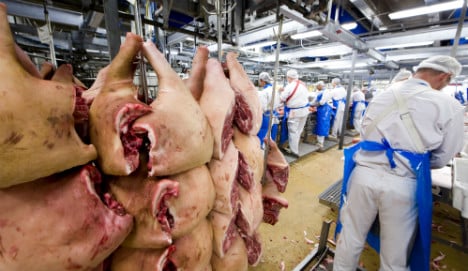The study was carried out by Swedish newspaper Dagens Nyheter in tandem with the National Veterinary Institute (Statens veterinärmedicinska).
For the test, 20 packets of German pork and 20 packets of Danish pork were bought in various stores in the Stockholm area.
When the results came back it was found that four of the Danish packets contained the resistant MRSA bacteria (Methicillin-resistant Staphylococcus aureus), while one of the German packets had the bacteria.
"It is just a matter of time before Swedish pigs get the bacteria and there is no plan of action," Björn Bengtsson of the National Veterinary Institute told Dagens Nyheter.
Pigs do not become ill from MRSA and the bacteria is not particularly dangerous for people who are healthy. But for people who are already feeling weak or poorly, exposure to the bacteria can lead to blood poisoning and in the worst cases death.
Despite the findings, experts conceded that the prospects of being infected through the pork were small.
"It's unlikely that you would become infected through meat but it is unpleasant to know that there are resistant bacteria in the food that you buy," Olov Aspevall, chief physician of the Swedish Public Health Agency (Folkhälsomyndigheten) told the newspaper.
Sweden has strict rules regarding the treatment and the importation of live pigs. Sick animals are treated individually, while in many other countries they give antibiotics to both healthy and sick animals.
Only a handful of cases involving MRSA in Swedish pigs have been found in recent years. The situation in neighbouring Denmark is rather different, where it was recently discovered that one in five packets of pork sold in Danish shops contained MRSA.
The Dagens Nyheter/National Veterinary Institute survey found four out of 20 Danish pork packets had the bacteria, compared to just one of 20 German packets.
"It could just be chance that there were fewer than in the Danish packages. Had there been more samples the result might have been different," added Björn Bengtsson.
Last year Sweden imported 142,000 tonnes of pig products, with three quarters of that amount coming from Denmark and Germany.


 Please whitelist us to continue reading.
Please whitelist us to continue reading.
Member comments